Menu
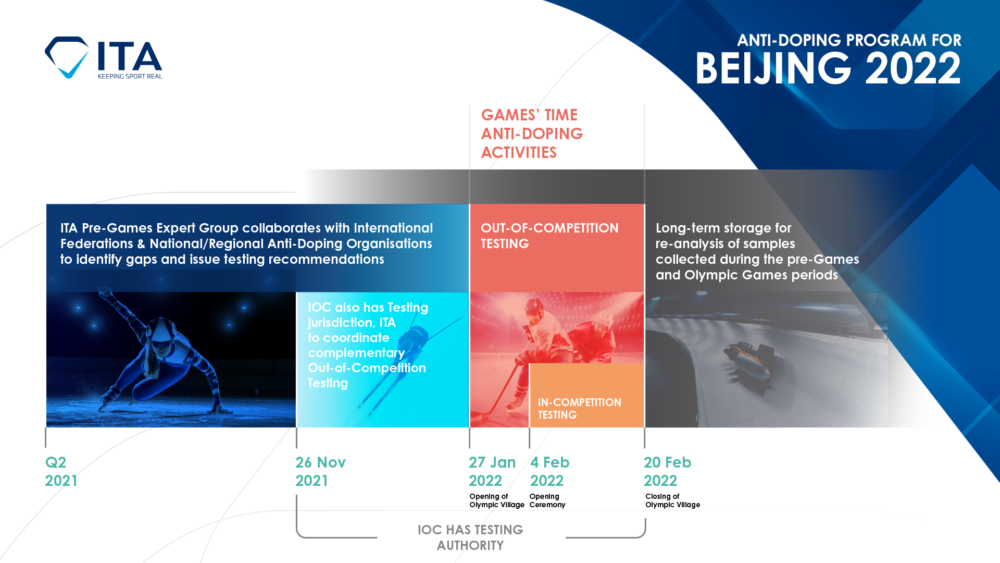
Long-Term Storage – samples of ADOs participating in the LTS program are stored in a centralised facility, as well as all samples collected by the ITA during Games-time.
22 July 2022
A total of over 3’100 collected samples from 55% of the athlete population and all 91 participating NOCs tested at least once – these are the final figures of the ITA’s anti-doping program for Beijing 2022. The WADA independent observer report, issued in July 2022, confirms the high quality of the ITA’s clean sport efforts for the winter Olympics.
The Beijing 2022 Olympic Winter Games ended on 20 February 2022, and with the recent publication of the World Anti-Doping Agency (WADA) Independent Observer (IO) Report, the ITA is now concluding its anti-doping program for the world’s biggest winter sporting event. The report states that the IO Team was “impressed by the anti-doping program implemented for the Beijing Games and congratulates the IOC, the ITA, Beijing 2022, the Beijing Laboratory, the CAS and all other stakeholders who contributed to the success of the anti-doping program and to protecting the integrity of the Games”.
During the Games-time anti-doping operations, more than 3’100 samples were collected, approximately half in- and half out-of-competition, from the opening of the Olympic Villages to the Closing Ceremony. These urine, blood and Dried Blood Spot samples stem from over 2’300 doping controls conducted on 1’600 athletes – which means that over 55% of the participating athletes were subject to at least one doping control. Furthermore, and for the first time in Olympic Games’ history, at least one athlete from each of the 91 participating National Olympic Committees (NOCs) was tested over the course of the Winter Games.
These results shows that the ITA was able to build on the experience gained during its mission for Tokyo 2020 and the innovations and strategies introduced for the Summer Games to successfully execute its full testing plan despite the ongoing Covid-19 pandemic and the demanding circumstances that accompanied it. Almost all recommendations concerning the ITA’s area of responsibility from the Tokyo 2020 IO report were taken into consideration and addressed for the Beijing 2022 anti-doping operations.
Proportionally to the size of the ten largest national delegations that participated in Beijing 2022, typical winter sport nations such as Italy, Germany, Sweden and Switzerland were tested most, followed by the three largest delegations participating: the Russian Olympic Committee (ROC), Canada and the United States. Cross-country skiing, ice hockey and biathlon were among the winter disciplines with the most doping controls (please see more details in the infographic below).
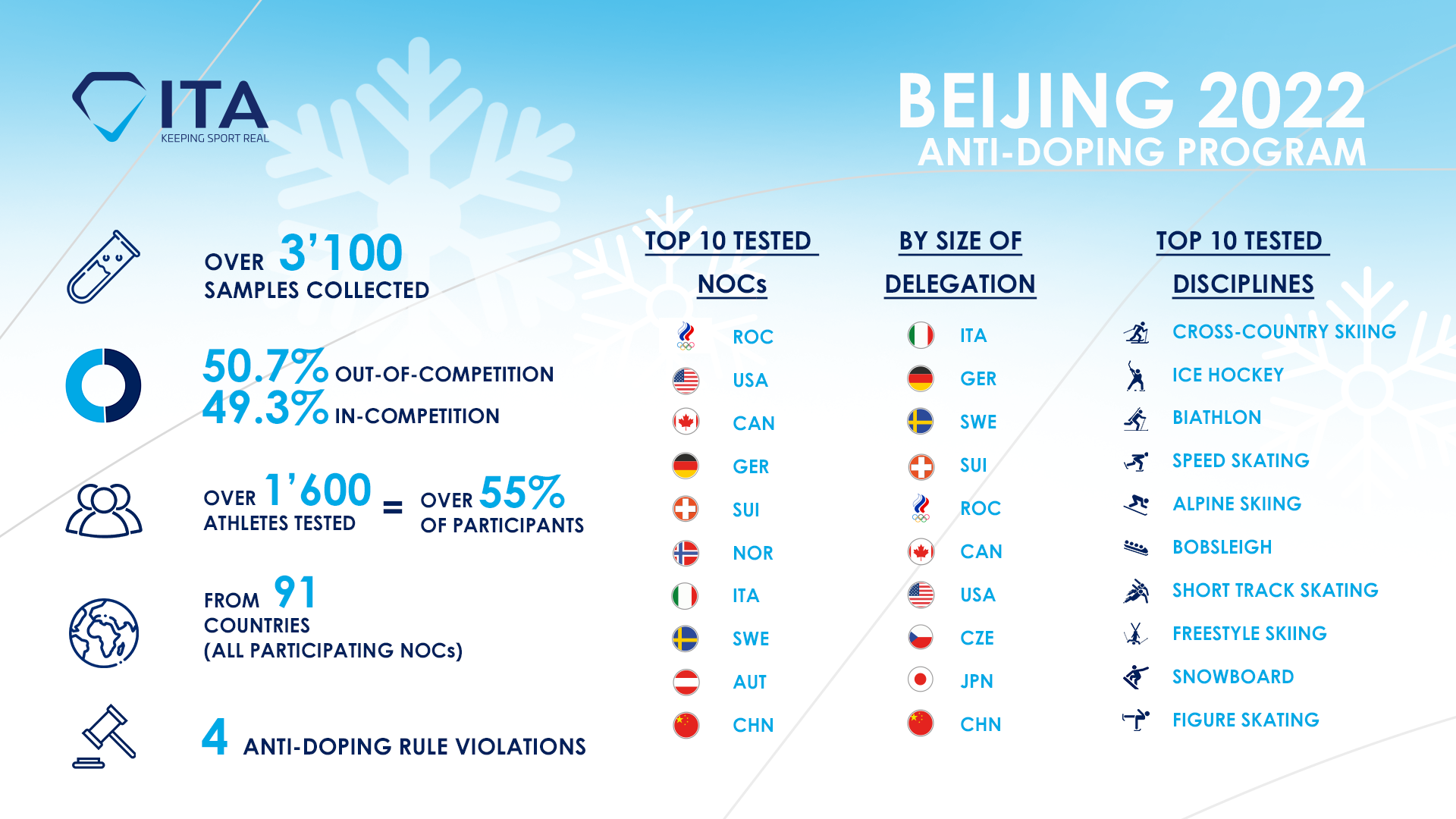
5 February 2022
With the opening of the XXIV Olympic Winter Games and the start of the competitions, the International Testing Agency’s Games-time anti-doping program for Beijing 2022 is in full force. Managing independent clean sport operations on behalf of the International Olympic Committee (IOC), the ITA plans on collecting around 2’900 samples through in- and out-of-competition doping controls.
The ITA had already begun its out-of-competition testing operations with the opening of the Olympic Villages at the end of January. The organisation’s 17 staff members present in all three venue clusters of the Winter Games will now additionally manage and oversee in-competition doping controls. Testing is targeted, relying on risk assessment, intelligence & investigations, data analysis and information provided by the ITA Beijing 2022 Pre-Games Expert Group. This approach ensures that the resources allocated to the fight against doping at the Winter Games are used responsibly and efficiently, with the quality of testing taking precedence over quantity.
To enforce this targeted approach and to ensure that relevant information is shared with the ITA’s Intelligence & Investigations (I&I) Department, a dedicated ITA Beijing I&I Task Force has been created. In addition, a dedicated secure intelligence platform was established to facilitate anti-doping organisations worldwide to share any relevant intelligence directly with the ITA. Part of these efforts includes a multi-lateral agreement with Chinese law enforcement and customs authorities. The ITA furthermore encourages all athletes, athlete support personnel or other persons with suspicions about potential doping offences to share these via the ITA’s confidential reporting platform REVEAL.
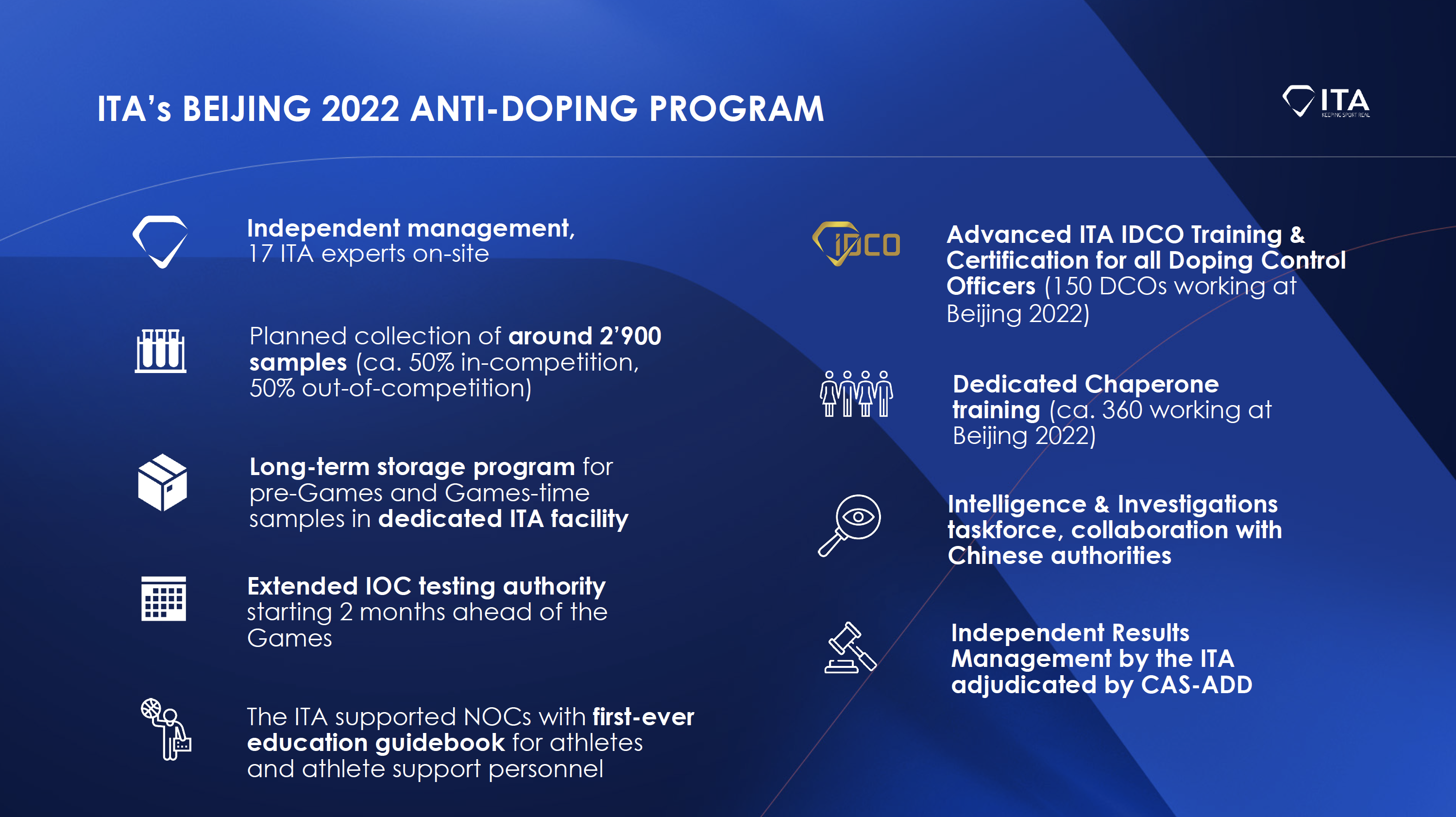
Hundreds of local and international experts and volunteers are deployed to implement the entire anti-doping program for the Games. Around 150 Chinese and international Doping Control Officers perform tests in the Doping Control Stations at the various venues, all of them received the ITA IDCO certification in preparation for their mission at this high-level major event. More than 360 Chaperones, all Chinese volunteers, also received dedicated training and will be responsible for notifying athletes that have been selected for testing. The ITA operations are supported by the human and logistical resources of the Organising Committee and the Chinese Anti-Doping Agency (CHINADA) as well as dozens of international experts for the implementation of these large-scale clean sport activities.
The around 2’900 samples that the ITA plans to collect will be analysed in the WADA-accredited anti-doping laboratory in Beijing. Next to the usual urine and blood samples, an innovative new collection process will be introduced for the Winter Games, the Dried Blood Spot method. Less invasive, it only requires one drop of blood following a prick in the finger instead of the sampling with a needle. Gene doping analysis will also be performed for the first time at an edition of the Olympic Winter Games. Which type of test an athlete is subject to depends on his or her individual risk assessment and the resulting type of analysis that is required. After the Games, all samples will be stored for up to 10 years in the ITA’s Centralised Long-Term Storage Facility and can be re-analysed at a later moment in time.
For the protection of all athletes that are tested, rigorous sanitary precautions and COVID-19 countermeasures are implemented to avoid putting them at risk during doping controls.
Should athletes need to use a prohibited substance to treat a medical condition, the ITA will oversee the processing of Therapeutic Use Exemptions following careful review by an expert independent medical panel.
As the IOC has also delegated results management to the ITA, the organisation will review all laboratory results and prosecute all potential anti-doping rule violations before the Court of Arbitration for Sport’s Anti-Doping Division (CAS ADD) for adjudication, making the entire legal process for the Winter Games completely independent.
All aspects of the ITA’s anti-doping operations for Beijing 2022 will be subject to monitoring and observation by a team of independent experts appointed by the World Anti-Doping Agency (WADA).
2 February 2022
The International Testing Agency (ITA), managing an independent anti-doping program for the Olympic Winter Games Beijing 2022 on behalf of the International Olympic Committee (IOC), concludes its pre-Games anti-doping program aiming at reinforcing worldwide efforts for doping controls ahead of the Winter Games. The over 5’400 recommendations issued by the ITA Beijing 2022 Pre-Games Expert Group were implemented at a high rate of 80%.
The opening ceremony of Beijing 2022 may mark the start of the event’s competitions, but anti-doping efforts to keep the Winter Games fair and clean began months before athletes travelled to China. Next to preparing for the Games-time anti-doping program, the ITA Beijing 2022 Pre-Games Expert Group consisting of independent ITA specialists, six experts from International Olympic Winter Federations (IFs) and National Anti-Doping Organisations (NADOs) as well as an athlete representative undertook an extensive risk assessment on potentially participating athletes while the Olympic Games Tokyo 2020 were still ongoing. The result of this risk assessment, over 5’400 testing recommendations for individual athletes and teams, were shared with the 7 Winter IFs and concerned NADOs in September 2021.
These recommendations supported the ongoing efforts of IFs and NADOs to make sure their athletes were subject to a robust testing program with a complementary layer of intelligence-led and targeted doping control guidance. After issuing its recommendations, the Expert Group continued to monitor the progress of the pre-Games anti-doping efforts and the implementation of the testing recommendations by the concerned anti-doping authorities – both for individual athletes and for the two Winter Olympic team sports ice hockey and curling.
The implementation rate of 80% of the recommendations shows an overall solid effort to test athletes ahead of the Games despite the ongoing Covid-19 pandemic as well as a good collaboration between all involved actors. This result means that 95% of the athletes for whom recommendations were issued have been tested at least once – the remaining athletes are most likely not to participate in the Games as the recommendations were shared ahead of the event for an extended group of athletes before the final qualification processes began.
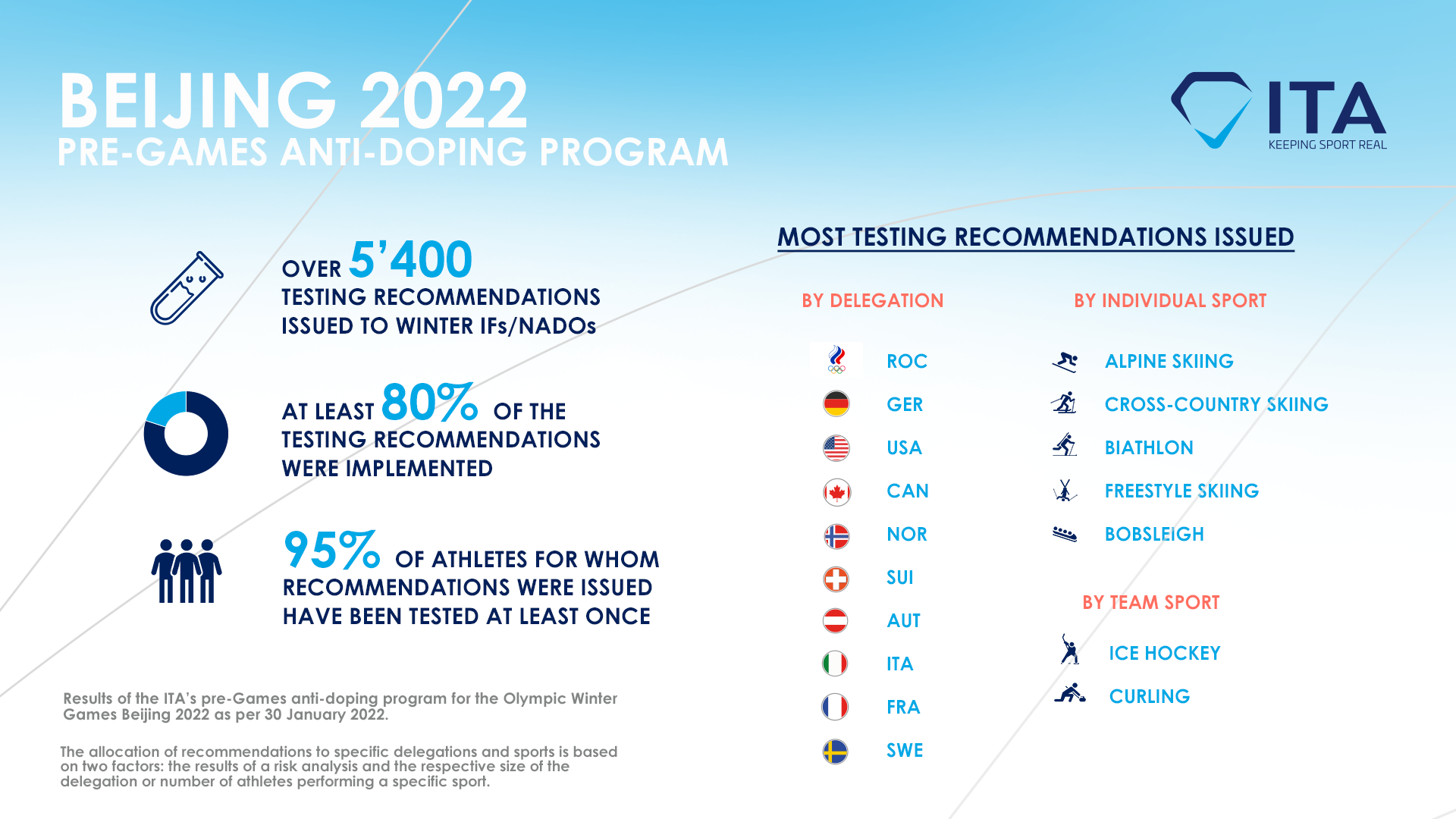
“These pre-Games efforts led by the ITA in cooperation with all concerned anti-doping organisations and with the support of the World Anti-Doping Agency happen during a higher risk period for doping offences: in the run-up to the Winter Games”, says ITA Director General Benjamin Cohen. “This is why the recommendations issued by the ITA Beijing 2022 Pre-Games Expert Group offer additional independent reference on who to test to avoid as much as possible any blind spots and to work towards robust testing efforts together to ensure fair play and the protection of athletes for Beijing 2022. Any gap identified by the Expert Group in the lead up to the Games is signalled to our team on-site in China and will be integrated into our testing plan. As the ITA has already started its Games-time anti-doping program, I wish to thank all committed organisations – International Olympic Winter Federations and NADOs – for their collaboration during this first and crucial phase of the anti-doping program for Beijing 2022.”
The risk assessment that served as a basis for the recommendations considered data such as participating countries, risks and history of doping as well as testing statistics in these countries, the physiological profile of the sport, individual data of the athletes, intelligence received, and other relevant factors. The number of recommendations was also related to the size of the delegations, as countries sending more athletes to the Winter Olympics naturally received more test recommendations than countries with smaller groups of athletes.
Next to issuing testing recommendations in the lead-up to the Games, the ITA also invites with the full support of the WADA all anti-doping organisations around the world to store for free the samples they have collected in that period in ITA’s Centralised Long-Term Storage Facility (CLTSF) thanks to a dedicated IOC-fund. The ITA calls upon all anti-doping organisations to make use of the program and store the samples they collect on Olympians under their authority at the ITA facility on a long-term basis for further analysis.
Athlete representative:
Dr. Yuhan Tan (Belgium, WADA Athlete Committee)
21 January 2022
The International Testing Agency (ITA) is pleased to announce the signing of a Memorandum of Cooperation (MoC) that will promote collaboration and facilitate information sharing in the lead-up to and during the Olympic Winter Games Beijing 2022.
The ITA is independently managing and monitoring anti-doping operations in the run-up to and during the Games, in close cooperation with the Beijing 2022 Organising Committee and with the full support of the China Anti-Doping Agency (CHINADA). To further ensure the implementation of an effective and robust anti-doping program and the sharing of relevant information on potential doping violations, the ITA has now entered into official cooperation with the relevant Chinese governmental agencies together with the Organising Committee and CHINADA.
In order to facilitate the exchange of information related to possible anti-doping violations, the ITA and all entities that have signed the MoC recognise the importance of close cooperation in the area of intelligence and investigations. All parties involved are fully committed to ensuring that the Games are clean and that all available measures can be taken swiftly should the use or trafficking of banned substances or methods be discovered in the context of the Olympic Winter Games Beijing 2022.
Under this new MoC, the ITA will be able to count on the full support of the Chinese General Administration of Sport, the Ministry of Public Security, the General Administration of Customs, CHINADA and the Beijing 2022 Organising Committee in relation to intelligence and anti-doping activities in connection with the Olympic Winter Games Tokyo Beijing 2022.
2 December 2021
The International Testing Agency (ITA), managing the anti-doping program for the Winter Olympic Games Beijing 2022 on behalf of the International Olympic Committee (IOC), invites anti-doping organisations to participate in the pre-Games long-term storage program for the Winter Olympics. This initiative aims at reinforcing anti-doping measures in the crucial phase leading up to the Games.
The period leading up to an Olympic Games is a critical time for anti-doping programs and the protection of participating athletes. To address this issue, the ITA is not only leading the most extensive pre-Games testing program ever implemented for an edition of the Winter Olympics but has also set up a large-scale pre-Games sample Long-Term Storage (LTS) program. This program, set up with a dedicated IOC fund and with the support of the World Anti-Doping Agency (WADA), offers anti-doping organisations fully developed logistics and infrastructure to store their samples at no further cost whilst retaining their authority over them. To this purpose, the ITA has established a highly secured Centralised Long-Term Storage Facility (CLTSF) ahead of the Olympic Games Tokyo 2020, which is already hosting the pre-Games and Games-time samples of the Summer Olympics.
The ITA, together with the IOC and WADA, now encourage all Winter Olympic International Federations (IFs) and National Anti-Doping Organisations (NADOs) to store samples collected during the time leading up to Beijing 2022 in the CLTSF with the support of the ITA, who will coordinate their shipment, referencing and storage in accordance with the International Standard for Laboratories.
The selection of samples for storage will be based on a risk assessment carried out by each organisation. The storage of samples and logistics will not incur any additional costs for the participating IFs and NADOs. Organisations storing their samples in ITA’s facility retain ownership and authority over them and can request re-analysis at any time – in that case, the ITA would arrange the transfer of the sample to a designated WADA-accredited laboratory. For this initiative to be a success, close cooperation between the ITA and all WADA-accredited laboratories involved is essential.
Long-term storage (LTS) of samples has emerged as one of the most impactful strategies to protect athletes and deter doping over the past decade. Today, under the World Anti-Doping Code, samples can be stored for up to 10 years after their initial analysis and still retain the same legal impact if re-tested and prosecuted. This allows them to be re-analysed for previously undetected substances, should scientific breakthroughs enable new technologies and analysis methods.
Next to enabling the systematic storage of samples collected before and during the Olympic Games, the ITA also proposes the development of LTS policies, sample storage in the CLTSF and the management of re-analysis programs to all Anti-Doping Organisations in order to help them reinforce their efforts to protect athletes and catch cheats.
19 November 2021
This resource was designed by the ITA to support all national Olympic Committees taking part in the Olympic Winter Games Beijing 2022 with the anti-doping education of their athletes and athlete support personnel ahead of the Games.
The NOC Anti-Doping Education Guidebook was developed by the ITA in collaboration with the International Olympic Committee (IOC) and with the support of the World Anti-Doping Agency (WADA) to support National Olympic Committees (NOCs) preparing their athletes and athlete support personnel for the Olympic Winter Games Beijing 2022. NOCs have a specific responsibility around Major Events, and that is to educate athletes and Athlete Support Personnel selected to participate in the Games. This guidebook provides all the necessary tools and resources to enable the NOCs in this process.

The new 2021 WADA International Standard for Education states that an athlete’s first experience with anti-doping should be through education rather than doping control.
“As the organisation responsible for conducting an independent anti-doping program on behalf of the IOC, it is important that we safeguard the integrity of the event not only through testing, but also in all other areas of anti-doping,” says Benjamin Cohen, ITA Director General. “This first-ever pre-Games education program is another way for us to protect all participating athletes. We thank the IOC and WADA for their support in this initiative and hope that NOCs will find this guidebook useful in their preparation for Beijing.”
The guidebook was designed specifically for National Olympic Committees, as well as National Anti-Doping Organisations working on pre-Games education in collaboration with their NOCs. However, any and all other sport and anti-doping organisations are also welcome to download and use this resource.
The guidebook is supported by a wide range of educational materials such as video tutorials, PowerPoint presentations, website guidelines, survey templates etc. Unique log-in credentials were created for each NOC and NADO to download and use these resources. Any other organisations wishing to receive access are invited to contact the ITA at [email protected].
This project is part of a bigger pre-Games education program conducted by the ITA on behalf of the IOC. A survey of NOCs was conducted earlier in the year to identify any gaps in anti-doping education such as lack of capacity, expertise and resources. NOCs that have requested support for anti-doping education planning and/or delivery through the survey have been contacted with the offer of additional assistance.
11 October 2021, Lausanne – Switzerland
The International Testing Agency (ITA) is activating the pre-Games phase of the comprehensive anti-doping program that it is leading for the upcoming Olympic Winter Games. The ITA Beijing 2022 Pre-Games Expert Group has issued over 5’400 testing recommendations that support all concerned International Federations and National/Regional Anti-Doping Organisations in implementing an anti-doping program ahead of the Games that is as extensive and robust as possible.
As the planning of the on-site anti-doping program for the Winter Olympics is underway, the ITA is embarking on the implementation of an advanced pre-Games testing strategy ahead of the event. In collaboration with specialists from International Olympic Winter Federations (IFs) and National Anti-Doping Agencies (NADOs) that form the Beijing 2022 Pre-Games Expert Group, the ITA has performed a systematic risk assessment on potentially participating athletes from all sports.
The over 5’400 testing recommendations resulting from this risk assessment have been shared for implementation with all International Federations and NADOs/RADOs that are responsible for testing athletes that might participate in the Winter Games. This additional layer of intelligence-led and targeted doping control recommendations complements the global efforts for clean and fair Games and helps to avoid potential testing gaps during this sensitive phase. The Olympic Winter Games PyeongChang 2018 were also accompanied by a dedicated pre-Games anti-doping program, at that time 3’500 recommendations were issued five months ahead of the event.
The ITA Beijing 2022 Pre-Games Expert Group will monitor the worldwide implementation of its recommended tests with the help of a dedicated platform until the start of the Games. This allows not only for close collaboration with all organisations that have received recommendations but also helps the ITA to adapt its testing strategy for Beijing 2022 to ensure a seamless and comprehensive doping program.
For better targeting, the ITA Beijing 2022 Pre-Games Expert Group is considering issuing a complementary wave of recommendations closer to the event when more information on potentially participating athletes is available. This phased approach with its incrementally specified testing recommendations would add another level of quality to the ITA’s pre-Games anti-doping program and further finetune the implementation of a proportionate clean sport program for all participating countries and 7 International Olympic Winter Federations with their 15 disciplines.
Benjamin Cohen, ITA Director General: “The important work we have done together with the ITA Tokyo 2020 Pre-Games Expert Group is proof that tackling doping during the phase leading up to the Games is a fundamental component of a serious anti-doping program. Should any athlete going to Beijing decide to enhance their performance through prohibited substances, it is most likely to happen during these few months before the Games – and that is why we support the ongoing global anti-doping activities with this additional and independent layer of testing recommendations. I wish to express my gratitude to the members of the ITA Beijing 2022 Pre-Games Expert Group for their time and pertinent collaboration with us as well as their dedication to working towards a fair and clean event for athletes. In advance, I also thank all organisations that have received testing recommendations for their valuable cooperation, and I want to share with them ITA’s strong motivation to achieve the highest level of implementation possible.”
The present development underlines the importance of the ITA Beijing 2022 Pre-Games Expert Group that relies on joined intelligence and strategy. Composed of ITA experts and six anti-doping specialists from IFs and NADOs, the group benefits from diverse backgrounds, nationalities and fields of expertise. Under ITA’s initiative, an athlete representative was for the first time in a Pre-Games testing project appointed jointly by the WADA Athlete Committee and the International Olympic Committee (IOC) Athletes’ Commission to attend the Expert Group meetings as observer. Moreover, the composition and international nature of this Expert Group adds to the independence of the Olympic anti-doping program. The group took up its work in April 2021.
Jakob Mørkeberg, Senior Science Manager at Anti Doping Denmark and member of the Pre-Games Expert Group: ”The process leading up to the filing of the recommendations has greatly benefited from the various perspectives each member of the group has brought to the table. I am convinced that this collaborative effort between representatives from NADOs, IFs and the ITA will evolve into an efficient and well-coordinated testing program before the Games.”
After the pre-Games phase and with the opening of the Olympic Villages the ITA will transition to the Games’ time testing program until the end of the competitions on 20 February 2022. The ITA encourages all organisations concerned by the Beijing 2022 pre-Games program to take part in its long-term storage program, so that not only all samples collected during the Games can be re-analysed in the future, but also as many pre-Games samples as possible.
Athlete representative:
Dr. Yuhan Tan (Belgium, WADA Athlete Committee)
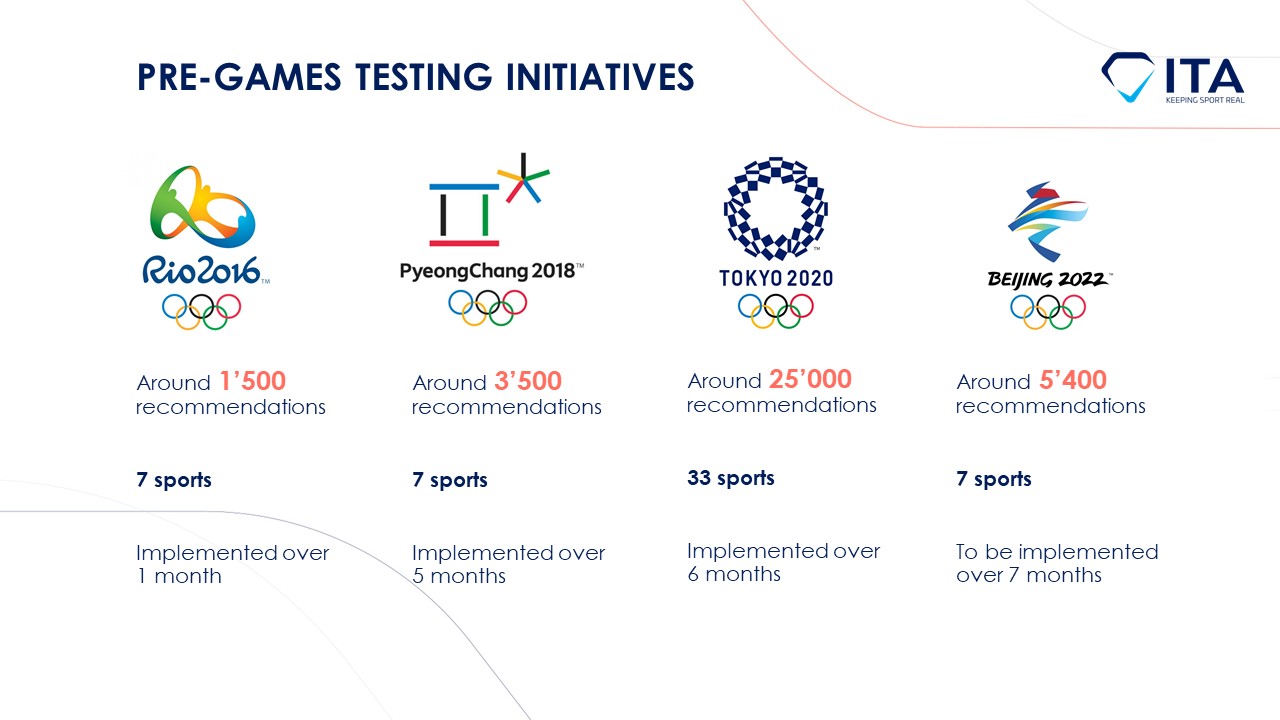
16 November 2021

5 October 2021

22 November 2021
